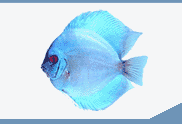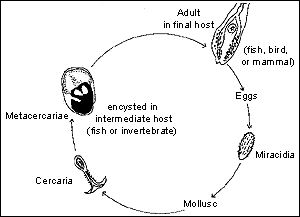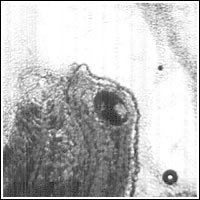

 |
||||||||||||
 |
||||||||||||
| Introduction to Freshwater Fish Parasites | ||||||
| Page 10 of 14 | Pages: 1 . 2 . 3 . 4 . 5 . 6 . 7 . 8 . 9 . 10 . 11 . 12 . 13 . 14 | |||||
DIGENEAN TREMATODES Digenean trematodes have a complex life cycle involving a series of hosts (Figure 18 ). Fish can be the primary or intermediate host depending on the digenean species. They are found externally or internally, in any organ. For the majority of digenean trematodes, pathogenicity to the host is limited.  Figure 18: An illustration of the Digenean trematodes life cycle.
Figure 18: An illustration of the Digenean trematodes life cycle.
 Figure 19: The metacercaria stage of the life cycle.
Figure 19: The metacercaria stage of the life cycle.
The life stage most commonly observed in fish is the metacercaria, which encysts in fish tissues ( Figure 19 ). Again, metacercaria that live in fish rarely cause major problems. However, in the ornamental fish industry, digenetic trematodes from the family Heterophyidae, have been responsible for substantial mortalities in pond-raised fish. These digeneans become encysted into gill tissue and respiratory distress is eminent. Another example of a metacercaria that could cause problems in cultured fish is the genus Posthodiplostonum or the white grub. This has caused mortalities in baitfish, but usually the only negative effect is reduced growth rate, even when the infection rate is high. In cases where mortalities occur, there are unusually high numbers in the eye, head, and throughout the visceral organs. Another fluke is Clinostonum, often called yellow grub. It is a large trematode and although it does not cause any major problems for fish, it is readily seen and will make fish unmarketable for aesthetic reasons. The best control of digenean trematodes is to break the life cycle of the parasite. Elimination of the first intermediate host, the freshwater snail is often recommended. Copper sulfate in ponds has been used with limited success and is most effective against snails when applied at night, due to their nocturnal feeding activity. For Florida ornamental fish growers a chemical for snail control, Bayluscide, is available. This is a Restricted Use Pesticide and access to it is controlled. For more information, contact your aquaculture Extension specialist or the University of Florida Tropical Aquaculture Laboratory in Ruskin, Florida. more ... |
 |
|||||
| About Us :: Message Board :: Chat | |||||
| Library :: Photo Gallery :: Links & Resources :: Breeders & Sponsors :: Merchandise | |||||
| Website designed by: EthanCote.com | © 2001-2004, SimplyDiscus.com. All Rights Reserved. | ||||